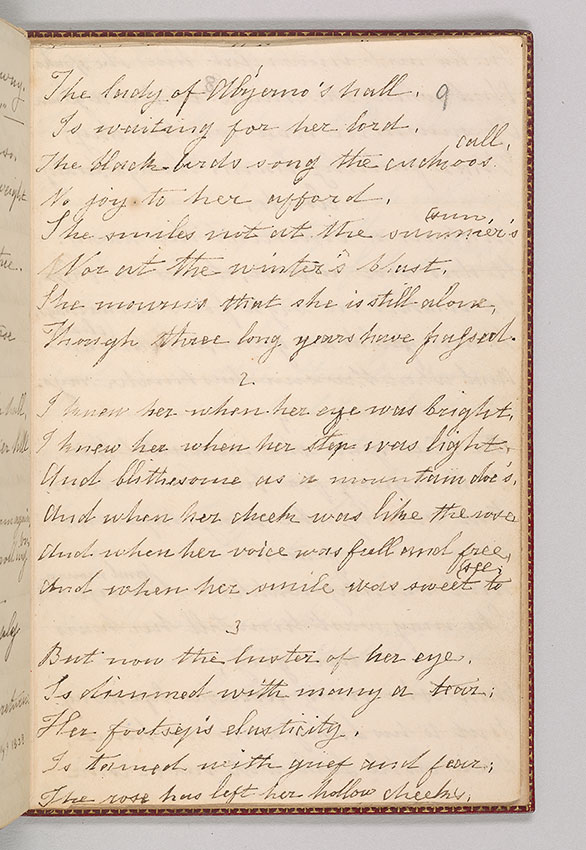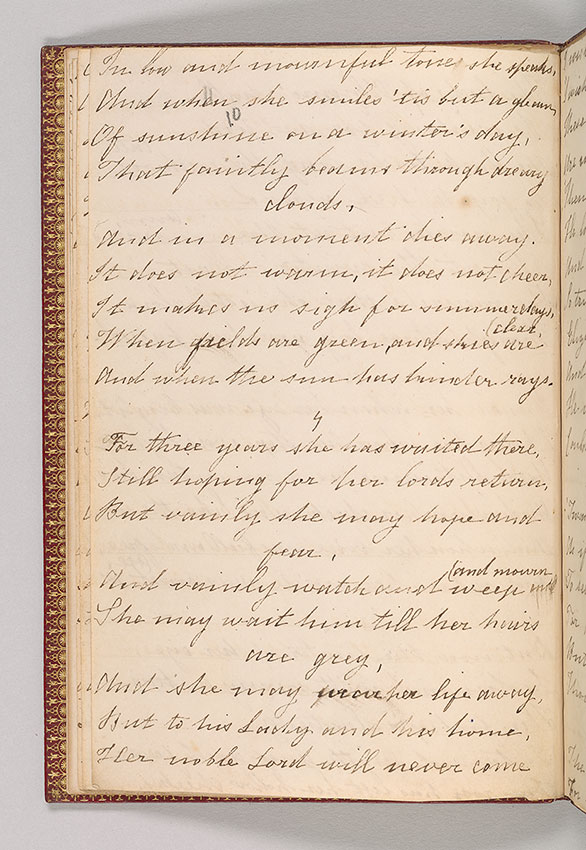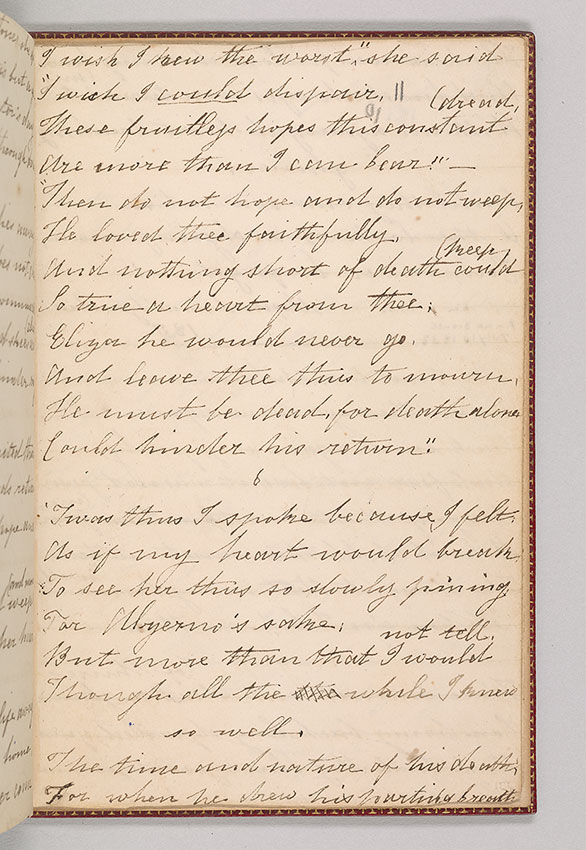["The lady of Alzerno’s hall"], p. 9

Collection of poems : autograph manuscript signed : [Haworth]
The Henry Houston Bonnell Brontë Collection. Bequest of Helen Safford Bonnell, 1969
[“The lady of Alzerno’s hall”] (pp. 9–12)
This untitled poem was presumably intended as the second part of the previous poem, “The Parting.” Brontë noted two dates at the end: the first, 1837, is the fictional date of composition by Alexandrina Zenobia; the second, 10 July 1838, is Brontë’s own date of composition (the day after she completed “The Parting”). First published in Poems (1902), pp. 192–94, with the incorrect title “The Lady of Abyerno’s Hall.” Published in The Complete Poems of Anne Brontë (London: Hodder & Stoughton, 1920) with the title “The Parting,” part II. Poem 7 in Chitham (1979); pp. 459–61 in Alexander (2010).
1
The lady of Alzerno’s hall,
Is waiting for her lord,
The black-bird[’]s song the cuckoo[’]s call,
No joy to her afford,
She smiles not at the summer’s sun,
Nor at the winter’s blast,
She mourns that she is still alone,
Though three long years have passed.
2
I knew her when her eye was bright,
I knew her when her step was light,
And blithesome as a mountain doe’s,
And when her cheek was like the rose,
And when her voice was full and free,
And when her smile was sweet to see,
3
But now the luster of her eye,
Is* dimmed with many a tear;
Her footstep’s elasticity,
Is tamed with grief and fear;
The rose has left her hollow cheeks;
*Note: Chitham (1979) transcribes the starred word as “So,” but the manuscript reads “Is.”
| Attachment | Size |
|---|---|
| 20.04 MB |
["The lady of Alzerno’s hall"], p. 10

Collection of poems : autograph manuscript signed : [Haworth]
The Henry Houston Bonnell Brontë Collection. Bequest of Helen Safford Bonnell, 1969
[“The lady of Alzerno’s hall”] (pp. 9–12)
This untitled poem was presumably intended as the second part of the previous poem, “The Parting.” Brontë noted two dates at the end: the first, 1837, is the fictional date of composition by Alexandrina Zenobia; the second, 10 July 1838, is Brontë’s own date of composition (the day after she completed “The Parting”). First published in Poems (1902), pp. 192–94, with the incorrect title “The Lady of Abyerno’s Hall.” Published in The Complete Poems of Anne Brontë (London: Hodder & Stoughton, 1920) with the title “The Parting,” part II. Poem 7 in Chitham (1979); pp. 459–61 in Alexander (2010).
In low and mournful tones she speaks,
And when she smiles ’tis but a gleam,
Of sunshine on a winter’s day,
That faintly beams through dreary clouds,
And in a moment dies away.
It does not warm, it does not cheer,
It makes us sigh for summer days,
When fields are green, and skies are clear,
And when the sun has kinder rays.
4
For three years she waited there,
Still hoping for her lord[’]s return,
But vainly she may hope and fear,
And vainly watch and weep and mourn,
She may wait him till her hairs are grey,
And she may pine wear her life away,
But to his Lady and his home,
Her noble lord will never come
| Attachment | Size |
|---|---|
| 20.04 MB |
["The lady of Alzerno’s hall"], p. 11

Collection of poems : autograph manuscript signed : [Haworth]
The Henry Houston Bonnell Brontë Collection. Bequest of Helen Safford Bonnell, 1969
[“The lady of Alzerno’s hall”] (pp. 9–12)
This untitled poem was presumably intended as the second part of the previous poem, “The Parting.” Brontë noted two dates at the end: the first, 1837, is the fictional date of composition by Alexandrina Zenobia; the second, 10 July 1838, is Brontë’s own date of composition (the day after she completed “The Parting”). First published in Poems (1902), pp. 192–94, with the incorrect title “The Lady of Abyerno’s Hall.” Published in The Complete Poems of Anne Brontë (London: Hodder & Stoughton, 1920) with the title “The Parting,” part II. Poem 7 in Chitham (1979); pp. 459–61 in Alexander (2010).
“I wish I knew the worst,” she said
“I wish I could dispair,
These fruitless hopes this constant dread,
Are more than I can bear!” —
“Then do not hope and do not weep,
He loved thee faithfully,
And nothing short of death could keep
So true a heart from thee;
Eliza he would never go,
And leave thee thus to mourn,
He must be dead, for death alone
Could hinder his return.”
6
’Twas thus I spoke because I felt,
As if my heart would break,
To see her thus so slowly pining
For Alzerno’s sake;
But more than that I would not tell,
Though all the the while I knew so well,
The time and nature of his death;
For when he drew his parting breath
| Attachment | Size |
|---|---|
| 20.04 MB |